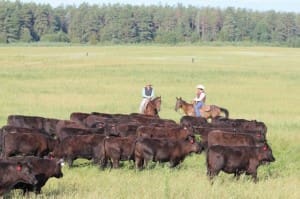Russia’s decision this week to place a 12 month ban on food imports from the West including Australia in response to sanctions over Ukraine will have little immediate impact on Australia’s export beef industry, but cattle exporters are still seeking answers as to whether their trade will be caught up in the ban.
There will be no direct impact on Australia’s beef export volumes because Russia suspended imports of Australian chilled and frozen beef in early April over alleged trenbolone growth promotant breaches.
Russia had been an important market for Australian beef previously, taking about 14,000t for the seven months ended July last year, but that has fallen to just 1780t for the corresponding period this year.
“So far this year Australia has exported more than 700,000 tonnes of beef to all markets, so what we were sending to Russia was a very small percentage, and when you have prices we’re seeing out of US and China at the moment, I think the impact will be very, very small,” MLA chief economist Tim McCrae told Beef Central this morning.
Live cattle
As of Beef Central’s publishing deadline today trade officials were still working to clarify what is and is not included in the ban, and were yet to confirm whether live cattle exports to Russia would be affected.
However it seemed unlikely from the documentation provided from Russia to date that the ban will extend beyond actual food products to cattle.
State-owned Russian cattle breeding enterprise Miratorg Agribusiness Holdings has been buying big volumes of Angus heifers and more recently feeder steers from Southern Australia in recent years, as well as from the US and Canada, under a broader long-term goal to return Russia to self-sufficiency in beef production.
LiveCorp figures show that Australia exported 50,080 cattle to Russia in the 11 months from July 2013 to May 2014.
In April, West Australian-based exporter Livestock Shipping Services delivered 32,000 Angus feeder steers from Southern Australia to Miratorg in Russia, an order that added a much-needed injection of fresh demand into the southern cattle market. At the time LSS manager Paul Keenan predicted that Russia could become a 100,000 head per year feeder steer export market.
Just last week Miratorg announced an additional US $47 million of investment using Government subsidies to further develop a US$750m project that has seen the State-owned company buy 33 farms so far. Its ultimate plan according to media reports is to run 250,000 cattle in a fully integrated operation including feedlots and abattoirs to supply domestic and export markets.
Impact for Kangaroo meat exports ‘minimal’
Ray Borda, manager of Macro Meats in Adelaide, Australia’s largest kangaroo meat supplier and only currently licensed exporter to Russia, said he understood kangaroo meat imports are included in the ban, but said the impact on Australian export volumes would be minimal.
This was largely because his company had made a decision to begin winding back exports to Russia in April when it imposed bans on Australian beef imports based on alleged HGP concerns.
“Some months ago when they first started to ban Australian beef because of supposed hormones, we backed off at that time because we could see that all wasn’t well,” Mr Borda said.
“Their economy was sliding into recession, the Crimea issue happened, and then when they banned Australian beef because of supposed hormones, we just sensed that this isn’t a business you need to rely on, so we wound it right back, and thankfully it proved to be right.”
Mr Borda said at that its peak the company was exporting 2-3 containers of Kangaroo meat to Russia per week but since April had reduced that volume to about one container per forthnight and then one per month.
He said Russia was a market that always paid reasonable money but was not a secure market.
“There are markets elsewhere, they pay a little bit less but they are more secure,” he said.
“It is difficult to build budgets and build a business on that type of insecurity.”
About 75pc of Macro Meats’ product is sold into the Australian domestic market, with the remaining 25pc that is exported divided mainly between the US and EU. Mr Borda said Macro Meats was also working to develop export markets into China.

